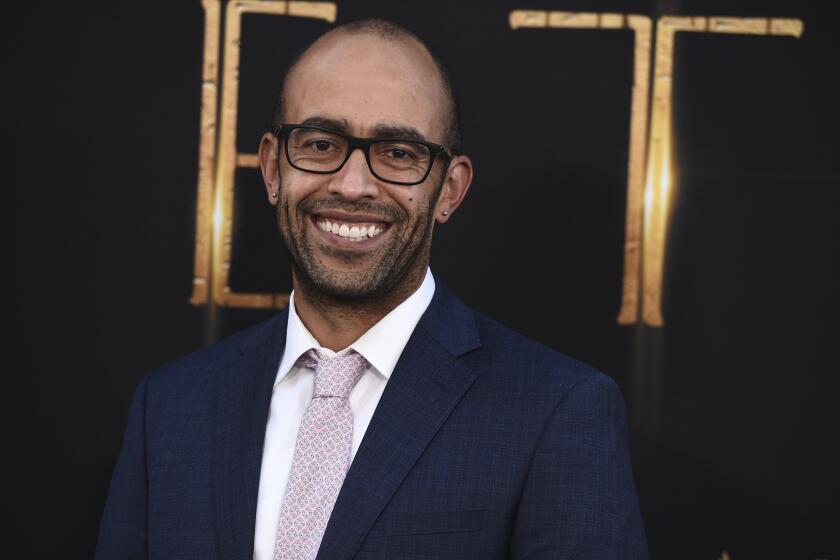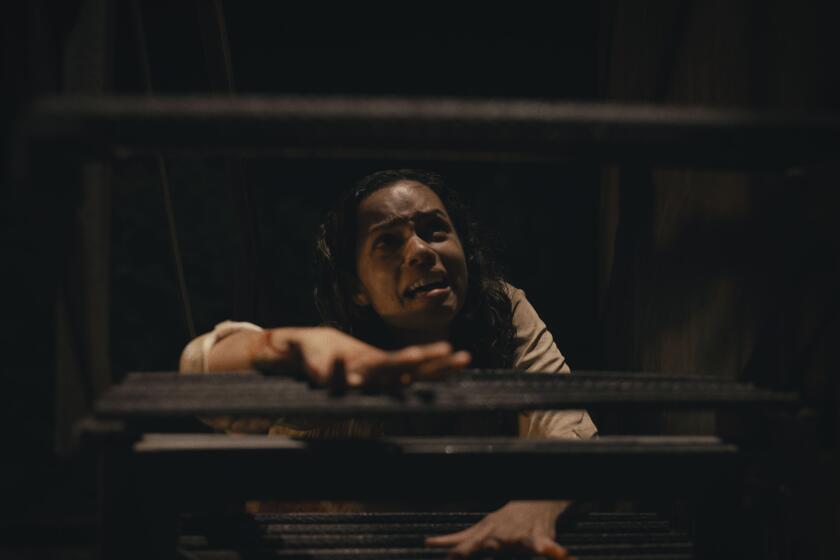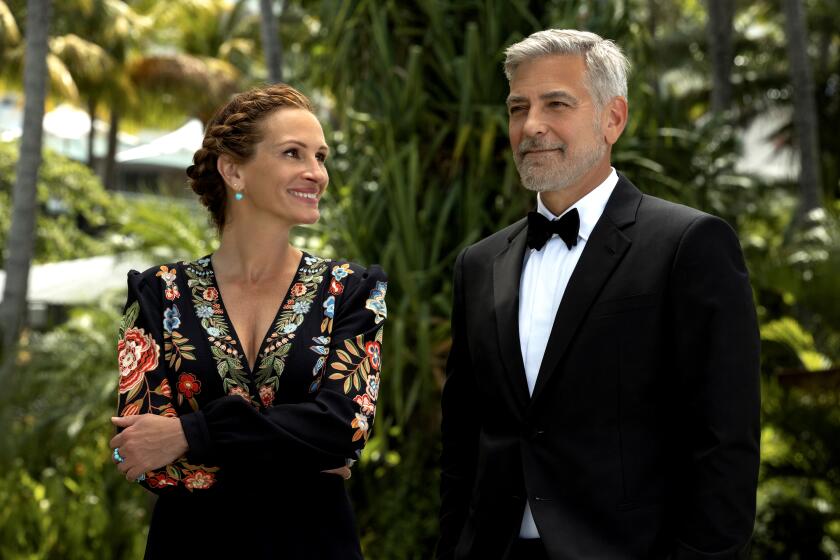Why these top agents are optimistic about the future of movies

It’s an uncertain time in the movie business, with box office, streaming and corporate consolidation all in a state of flux. That’s kept life interesting for Hollywood talent agents like Joel Lubin and Maha Dakhil, the co-heads of Creative Artists Agency’s motion picture group.
Studio strategies suddenly change, depending on the priorities of media conglomerate parent companies. A movie greenlighted for a streaming release by one studio regime could be scrapped without warning when another leadership team takes over, which is what happened to Warner Bros.’ “Batgirl.”
A film approved for the small screen could be switched to a theatrical release, or vice versa. The shifting landscape has forced agents to be more attentive and nimble with their clients’ movies.
“It used to be about setting up a project,” said Dakhil, who also co-heads CAA’s international film division. “We now are in it from the inception all the way to the release, meeting with the marketing departments, discussing distribution plans, and really advising and caring for the project all the way to the finish line. We really never get off the train at this stage, because the market is so changeable.”
Agencies have had to adapt quickly to market forces.
As studios turned their attention to franchises, talent shops took it upon themselves to package star-driven movies for grown-ups, with CAA playing key roles in Oscar hopefuls such as Todd Field’s “Tár,” starring Cate Blanchett (released by Focus Features); and Martin McDonagh’s “The Banshees of Inisherin,” starring Colin Farrell (Searchlight Pictures); and securing a $65-million deal for a Lee Daniels-directed horror film at Netflix.
And in an era when intellectual property has challenged the commercial primacy of star power, agents are nonetheless developing a new generation of audience-drawing talent such as Zendaya (“Euphoria,” “Dune”), Anya Taylor-Joy (“The Menu”) and Harry Styles (“My Policeman”).
Blanchett plays a renowned classical conductor whose world gradually comes apart in this virtuoso return to filmmaking from writer-director Todd Field (“In the Bedroom,” “Little Children”).
Century City-based CAA itself entered a new era when the TPG-backed company in July closed its acquisition of rival agency ICM Partners in a deal valued at $750 million, which added 425 agents to its roster.
The Times spoke to Lubin and Dakhil about the state of blockbusters, indie film, profit participation and worries about a rollback on progress for women and people of color in the industry, at a time when agencies have also come under scrutiny for their handling of diversity and inclusion.
This conversation was edited for length and clarity.
With so much uncertainty in film, where do you see the biggest opportunities?
Joel Lubin: While there’s been all these changes in terms of how things are consumed, the one thing that hasn’t changed is the need for storytelling and people’s appetite for stories. You’re referring to how people see it or where people see it, and that’s been incredibly fluid. One week, we could be seeing one trend, and the next week, we could be surprised by a result of another film. We try not to be too rigid around our views as things are evolving. Some things are meant for a theatrical experience and other times, streaming can be a really good platform for storytelling and premium content.
Maha Dakhil: I would say the opportunity is everywhere. It really depends on matching the right project to the right distribution model. The studios are always going to be in flux. The nice thing about being an agency is we are right next to the artists. And whatever’s happening out there, at some point the studios are going to need to develop their slates. It’s a fun, interesting time, actually, because it’s fertile ground.
Nate Moore pushed for Black Panther’s introduction in “Captain America: Civil War.” His latest, “Black Panther: Wakanda Forever,” seeks closure after tragedy.
What’s an example of how things have pivoted?
Lubin: Before “Top Gun: Maverick” was released, there was definitely some consensus that adult moviegoers were less likely to go to the theaters, and that movie dispelled that. The second something like that happens, the conversation changes and there’s more openness towards the idea that adults will go to the movies.
But do you try to avoid reacting to short-term trends? Recently, horror has been hot, while other genres, like rom-coms, have struggled.
Lubin: Yeah. It’s simplistic when people have fixed views around what works and what doesn’t, because a lot of times what works is originality and high quality. We try as hard as we can not to get stuck in a momentary trend, but you do have to also pay attention to where the wind is blowing.
Horror movies have always had a dedicated fan base. But as other genres lose their power, scary films have become a much-needed hotbed of creativity and commercial power.
What’s the health of the market for specialty releases and Oscar hopefuls like “Tár” and “The Banshees of Inisherin?”
Lubin: You’d have to do a deeper analysis in about five months, when we get to the end of that cycle. It’s a little early to declare exactly where that stands.
Dakhil: They’ve performed with varying degrees of success. “Tár” had a really high per-screen average. It’s going to be about the runway between now and the awards, and we’re really committed to making sure that those films still have a theatrical presence because it’s important for the legacy of filmmaking.
Why is there reason for optimism?
Dakhil: Because originality of storytellers will still draw an audience. You’ll see a movie that our client Halina Reijn made, “Bodies Bodies Bodies.” Our client Jamie Lee Curtis is in “Everything Everywhere All at Once.” Who saw that coming? It gives you not just hope, but evidence.
Well also, it’s required for Oscars that movies be shown in theaters.
Dakhil: And it’s required.
The business is a lot more flexible with release strategies between theaters and at-home viewing. How does that change what agents do?
Dakhil: It’s good not to be rigid about anything, because everything’s changing monthly. In the last several years, agents’ roles have changed. It used to be about setting up a project. We now are in it from the inception all the way to the release, meeting with the marketing departments, discussing distribution plans, and really advising and caring for the project all the way to the finish line. We really never get off the train at this stage, because the market is so changeable.
In the age of IP, what defines a movie star?
Lubin: We’re talking on the heels of “Ticket to Paradise” doing very well right now, which you have to attribute a lot of its success to George Clooney and Julia Roberts and their star power.
People like George Clooney and Julia Roberts have been in our lives for decades. What is the path for creating new stars?
With its better-than-expected opening, “Ticket to Paradise” proves there’s still life in the rom-com, at least when stars like Julia Roberts and George Clooney are on board.
Lubin: It’s about identifying a platform or a jumping-off point for an emerging actor or director or writer. What is the platform where they can tell a story or be in a project that is seen by people who can help continue to elevate their work? It’s a building process. You know, people forget that a lot of the people that you’ve mentioned have been with us since the very beginning of their careers, so we’re patient and supportive about trying to identify the opportunities that can lead to visibility and create more exposure.
Dakhil: With movie studios developing mostly franchises, a lot of young people are being catapulted in the franchise space, and that gives them the star power to help make an independent film. We believe in the future of movie stars, but it requires a lot more strategy and thought. It’s just a finer, smaller target, but it’s the reason we, as agents, exist.
How is the growth of international crossovers, like “Parasite” and “Squid Game,” changing the pathways for new stars?
Lubin: One of the more exciting things from a perspective of inclusivity is that the world of entertainment has become global. The language of the show is secondary to the actual art. That’s a huge shift. Audiences like to see cultures that they’re not part of. That’s been one of the more positive shifts that has come partly from the proliferation of streamers.
Dakhil: For example, we signed Omar Sy many years ago off a French film and he went on to star in the French TV show “Lupin.” Now he really wants to do English-language movies as well, and we can raise money off of his name. That is just a perfect example of how this global ecosystem can be harnessed.
We’re seeing deals like Reese Witherspoon selling her company Hello Sunshine at a $900-million valuation. Is that becoming something that clients want to build toward?
Dakhil: It just depends on the kind of storyteller they are, their bandwidth and their desire to connect across different verticals. And of course, Reese was a real pioneer at it, but I don’t think it’s for everyone, even if the opportunity is there. We, of course, are excited that people can use their star power to create several other businesses and touch other industries.
Hello Sunshine, “South Park” and MGM deals reveal how streaming is boosting the value of content brands, not just libraries.
Do you worry that the cutbacks from studios and streamers will reverse some of the gains that have been made by women and people of color in the entertainment industry?
Dakhil: I think that it’s true. We’re seeing a rollback on progress in the greater world, which of course is going to affect us as well. But I think we’ve done a pretty good job of being advocates of inclusion and progress. We are not going to allow buyers to go back. And so we have those very honest conversations. But we also have incredible data that show that it’s not just the right thing to do, it’s the lucrative thing to do. It’s our job to make buyers see it that way.
When Warner Bros. axed “Batgirl,” your phones must’ve been ringing off the hook.
Dakhil: It was completely unprecedented and it solicited comment from everybody in our industry.
Are clients satisfied with streamers offering big upfront payments to buy out their profit participation, or do they increasingly want skin in the game?
Lubin: If you were trying to generalize on that, most people want as much ownership over their work as possible. If that’s not possible, they need the information for why that’s not possible. And if it’s going more in the direction of a buyout, we try to make up the difference of what that would look like in the case of ownership. And it’s really about information and deep transparency, so they can understand what they’re signing up for.
More to Read
Inside the business of entertainment
The Wide Shot brings you news, analysis and insights on everything from streaming wars to production — and what it all means for the future.
You may occasionally receive promotional content from the Los Angeles Times.
















